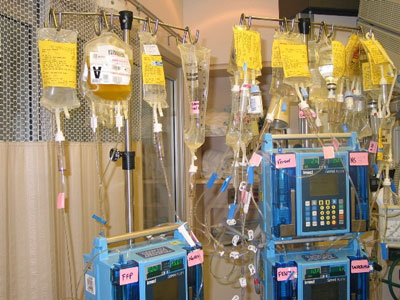An ongoing dialogue on HIV/AIDS, infectious diseases,
March 31st, 2009
Infectious Disease in the ICU: Help Please? Part II
 In Part I of this topic, I commented on the ironic sameness of ICU Infectious Diseases — that incredibly sick, complex patients entered the ICU with vastly different problems, then over time, seemed to converge, presenting similar kinds of clinical issues and management challenges for the ID doc.
In Part I of this topic, I commented on the ironic sameness of ICU Infectious Diseases — that incredibly sick, complex patients entered the ICU with vastly different problems, then over time, seemed to converge, presenting similar kinds of clinical issues and management challenges for the ID doc.
Or, as a visiting medical student said to me, “My ICU attending said that every patient in the ICU should be on vanc/Zosyn.”
Which brings up the issue of empiric antibiotics. On the one hand, there’s the hard-line view that we should only be giving antibiotics for clinically or microbiologically confirmed infections. All antibiotics have side effects, they select for ever more-resistant flora, and may diminish the accuracy of our diagnostic tests. In one commentary on this issue, the author wrote:
The indiscriminate use of antibiotics substantially contributes to the “spiraling empiricism” that characterizes contemporary medical therapy… Broad spectrum systemic antibiotics have become the specific treatment of fever. When I was a medical student, the medical residents taught that cephalothin was the “antipyretic of choice” …
–snip–
The decision to withhold or discontinue antibiotics, however, necessitates an extensive and compulsive physical examination and personal review of all the pertinent evidence (gram stains, urinalysis, radiographs, laboratory values). Critical historical data should be confirmed. Patients must be turned and wounds undressed. Less exhaustive evaluation is inadequate.
Yes, well…. but this view, less elegantly stated, risks sounding like ivory tower medicine at its worst, and brings to mind the sad truth that withholding antibiotics is one of the few things an ID doctor can do to sound macho.
Critically-ill patients with fever should receive some sort of empiric broad-spectrum coverage, at least initially. As one of our fellows just asked me, once the diagnostic evaluation has been done, what else can we offer them? We’ve all been in that uncomfortable position of suggesting that antibiotics be withheld or stopped, then have that critically-ill patient later develop a life-threatening bacterial infection.
Sure, it may have happened anyway — these are highly susceptible hosts, after all — but it just feels worse when it’s done without antibiotics on board. Let’s hope our diagnostic studies in these patients can improve, because absent better testing, I’m afraid we’re going to be stuck with lots of “spiraling empiricism.”

